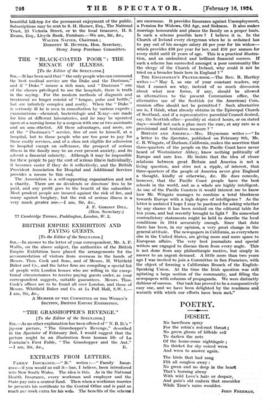EXTRACTS FROM LETTERS.
FAMILY INSURANCE.—" B." writes :—" Family Insur- ance—if you would so call it—has, I believe, been introduced in to New South Wales. The idea is this. As in the National Health Insurance, every workman and employer and the State pay into a central fund. Then when a workman marries he presents his certificate to the Central Office and is paid so much per week extra for his wife. The benefits of the scheme are enormous. It provides Insurance against Unemployment, a Pension for Widows, Old Age, and Sickness. It also makes marriage honourable and places the family on a proper basis. Is such a scheme possible here ? I believe it is. In the Church of Ireland every clergyman when he is ordained has to pay out of his meagre salary £8 per year for his widow— which provides 150 per year for her, and 110 per annum for every child until 21 years of age. This is a practical illustra- tion, and an undoubted and brilliant financial success. If such a scheme has succeeded amongst a poor community like the clergy of the Church of Ireland, why could it not be tried on a broader basis here in England ? "
THE ENGLISHALAN'S PRAYER-BOWL—The Rev. R. Hartley writes :—" May I, as one of your constant readers, say that I cannot see why, instead of so much discussion about what new forms, if any, should be allowed as alternatives to the present Communion office, the alternative use of the Scottish (or the American) Com- munion office should not be permitted ? Such alternative use is, I think, what already obtains in the Episcopal Church of Scotland, and if a representative parochial Council desired, say, the Scottish office—possibly at stated hours, or on stated days—would not such a plan meet the case, at any rate as a provisional and tentative measure ? "
BRITAIN AND AMERICA.—Mrs. Heyneman writes :—" In a letter to the Spectator, published on February 9th, Mr. C. B. Wingate, of Durham, California, makes the assertion that three-quarters of the people on the Pacific Coast have never heard of Westminster Abbey, know nothing politically of Europe and care less. He insists that the idea of closer relations between great Britain and America is not a living question, and stirs not a ripple, of interest, that three-quarters of the people of America never give England a thought, kindly or otherwise, etc. He does concede, however, that the Pacific Coast people have, the best schools in the world, and as a whole are highly intelligent. As one of the Pacific Coasters it would interest me to know how Mr. Wingate manages to combine a total blankness towards Europe with a high degree of intelligence ? As the letter is undated I hope I may be pardoned for asking whether by any chance it has been mislaid on the editorial table for ten years, and but recently brought to light ? Its somewhat contradictory statements might be held to describe the local conditions in 1914 accurately enough. Since that date there has been, in my opinion, a very great change in the general attitude. The newspapers in California, as everywhere else in the United States, are giving more and more space to European affairs. The very best journalists and special writers are engaged to discuss them from every angle. This is not done from any philanthropic motive, but simply in answer to an urgent demand. A little more than two years ago I was invited to join a Committee in San Francisco, with the object of forming a Californian Branch of the English- Speaking Union. At the time the Irish question was still agitating a large section of the community, and filling the newspapers with columns of propaganda. We were distinctly dubious of success. Our task has proved to be a comparatively easy one, and we have been delighted by the readiness and warmth with which our efforts have been met."










































 Previous page
Previous page